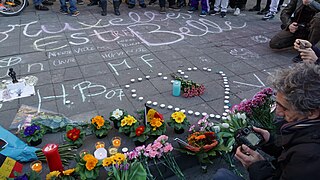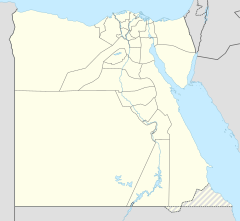The August 2012 Sinai attack occurred on 5 August 2012, when armed men ambushed an Egyptian military base in the Sinai Peninsula, killing 16 soldiers and stealing two armored cars, which they used to infiltrate into Israel. The attackers broke through the Kerem Shalom border crossing to Israel, where one of the vehicles exploded. They then engaged in a firefight with soldiers of the Israel Defense Forces (IDF), during which six of the attackers were killed. No Israelis were injured.

The Sinai insurgency was an insurgency campaign in the Sinai Peninsula of Egypt launched by Islamist militants against Egyptian security forces, which also included attacks on civilians. The insurgency began during the Egyptian Crisis, during which the longtime Egyptian president Hosni Mubarak was overthrown in the 2011 Egyptian revolution.

Operation Sinai was an Egyptian military campaign, launched in early August 2012, against Islamic militants within the Sinai Peninsula to crush the Sinai Insurgency. The operation came as a direct response to the 2012 Egyptian-Israeli border attack on 5 August 2012. The operation was initially reported as part of "Operation Nisr", but on 3 September 2012, the Egyptian army issued a statement requesting media sources to use the official name "Operation Sinai."
On 16 July 2014, militants from the Uqba Ibn Nafi Battalion attacked two checkpoints in the Chaambi Mountains killing fourteen Tunisian soldiers and injuring twenty-five. The 2014 Chaambi Mountains attack is the deadliest militant skirmish involving the Tunisian Armed Forces since their independence in 1956.
The 2014 Farafra ambush occurred on 19 July 2014 when unidentified gunmen ambushed a desert checkpoint in the Farafra Oasis Road in Egypt's New Valley Governorate. Twenty-two border guards were killed in the attack, which was one of the biggest since the July 2013 ouster of Egyptian president Mohamed Morsi and the second at the same checkpoint in less than three months.
On 24 October 2014, militant group Ansar Beit al-Maqdis ISIL launched two attacks on Egyptian Armed Forces positions in the Sinai Peninsula, killing at least 33 security personnel in one of the deadliest assaults on the Egyptian military in decades.
The response to the 2014 Peshawar school massacre, that occurred on 16 December 2014 was widespread. The attack occurred at the Army Public School in the Pakistani city of Peshawar, killed a total of 145 people which included 132 school children and ten school staff members.
On 29 January 2015, militants from the ISIL-affiliated Wilayat Sinai militant group launched a series of attacks on army and police bases in Arish using car bombs and mortars. The attacks, which occurred in more than six different locations, resulted in 44 deaths.
On 1 July 2015, the IS-affiliated Sinai Province militant group launched the largest scale battle the Sinai Peninsula has seen since the 1973 Yom Kippur War, killing 21 soldiers in the numerous attacks which targeted multiple Egyptian army checkpoints and the Sheikh Zuweid police station in the Sinai Peninsula. More than 100 militants were reportedly killed by the army during the battle.

In July 2013, at the same time as mass protests began against the 3 July coup d'état which deposed Mohamed Morsi, and in parallel with the escalation of the already ongoing jihadist insurgency in the Sinai Peninsula, pro-Muslim Brotherhood militants started violent attacks against policemen and soldiers in central and western Egypt. In the following months, new Islamist armed groups were created to reinstate Islamist rule in Egypt, like Soldiers of Egypt and the Popular Resistance Movement. Since 2013, violence in mainland Egypt has escalated and developed into a low-level Islamist insurgency against the Egyptian government.

A number of countries, national leaders and international organisations expressed comments or lit monuments in reaction to the 2016 Brussels bombings.

The 2016 Uri attack was carried out on 18 September 2016 by four Jaish-e-Mohammed terrorists from Pakistan against an Indian Army brigade headquarters near the town of Uri in the Indian Jammu and Kashmir. 19 Indian soldiers were killed in the attack, and 19–30 others were injured. It was reported by the BBC as having been "the deadliest attack on security forces in Kashmir in two decades".

On the evening of 10 December 2016, two explosions caused by a car bombing and suicide bombing in Istanbul's Beşiktaş municipality killed 48 people and injured 166 others. 39 of those killed were police officers, 7 were civilians and 2 were perpetrators. The Kurdistan Freedom Hawks (TAK) assumed responsibility, claiming that their members killed more than 100 police officers.

On 11 December 2016, a suicide bomber killed 29 people and injured 47 others at St. Peter and St. Paul's Church, a chapel next to Saint Mark's Coptic Orthodox Cathedral, seat of the Coptic Orthodox Pope, in Cairo's Abbasia district. Egypt's President, Abdel Fattah el-Sisi identified the bomber as 22-year-old Mahmoud Shafiq Mohammed Mustafa, who had worn a suicide vest. el-Sisi reported that three men and a woman have been arrested in connection with the attack; two others are being sought. ISIS claimed responsibility for the attack.

On December 17, 2016, a suspected car bombing in Kayseri, Turkey killed 15 soldiers aboard a bus and wounded at least 55 others. According to the Daily Sabah newspaper, the soldiers — all low-ranking privates and non-commissioned officers — had been given permission for leave from the commando headquarters in the city. The explosion comes a week after 44 people were killed in a double bombing in Istanbul after a football match.
On 21 January 2017, a bomb was detonated at a vegetable market in Parachinar, in the Kurram Valley of the Federally Administered Tribal Areas of Pakistan. At least 25 people were killed and 87 injured by the explosion. Parachinar is the administrative headquarters of the Kurram Agency near the Afghan border. The same area has previously seen several blasts in 2008, February 2012, September 2012, 2013 and in December 2015.
On Palm Sunday, 9 April 2017, twin suicide bombings took place at St. George's Church in the northern Egyptian city of Tanta on the Nile delta, and Saint Mark's Coptic Orthodox Cathedral, the principal church in Alexandria, seat of the Coptic papacy. At least 43 people were reported killed and 789 injured. The attacks were carried out by a security detachment of ISIS.
On 26 May 2017, masked gunmen opened fire on a convoy carrying Copts from Maghagha in Egypt's Minya Governorate to the Monastery of Saint Samuel the Confessor, killing at least 33 people and injuring 22 others.

On 2 March 2018, at least eight heavily armed militants launched an assault on key locations throughout Ouagadougou, the capital city of Burkina Faso. Targets included the French embassy and the headquarters of Burkina Faso's military.
The Rafah terror attack was a terrorist attack conducted by the Islamic State – Sinai Province on an Egyptian Armed Forces checkpoint in Rafah in North Sinai on 7 July 2017 and resulted in the death and injury of 23 Egyptian soldiers, including the high-ranking El-Sa'ka officer, Col. Ahmed Mansi. 46 terrorists were killed and six cars of the militants were destroyed in the attack.









